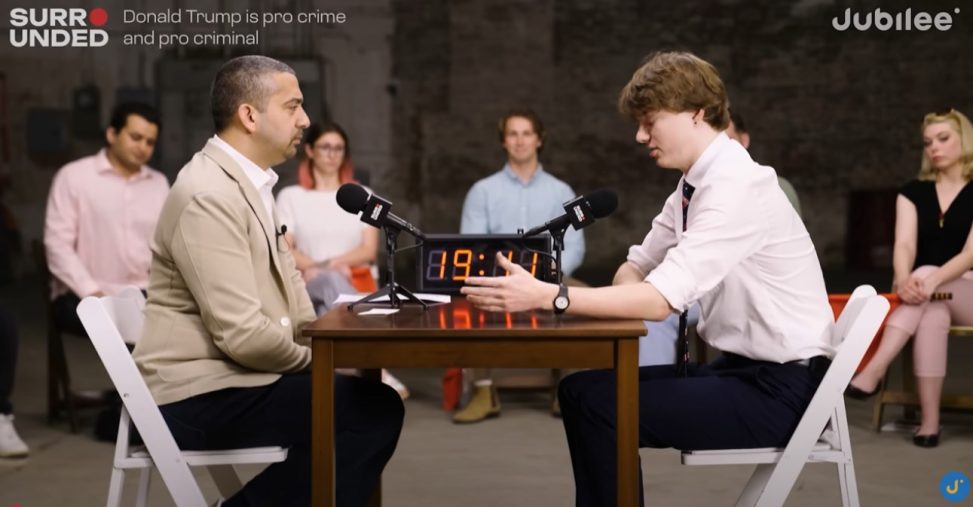A recent viral video titled “1 Progressive vs. 20 Far-Right Conservatives (ft. Mehdi Hasan)” might look like just another YouTube debate—made to provoke, clipped for clicks. But it does more than generate engagement. It offers a glimpse into something far more unsettling: a generation that has grown up in one of the world’s most economically powerful nations, yet shows alarming signs of not knowing its own history, values, or civic responsibilities.
The United States has always taken pride in the idea of the American Dream—a promise of upward mobility through hard work. That dream has brought countless families here, including my own. But over time, that dream has narrowed. Economic success became the only goal, while the other pillars of a healthy democracy—education, critical thinking, and historical awareness—were left to erode.
In a society where college can cost tens of thousands of dollars, where student debt cripples families, and where access to quality education is often determined by zip code, we shouldn’t be surprised when fewer Americans can explain what fascism is—let alone why it’s dangerous. Watching the viral video, I saw not just a clash of ideologies, but a symptom of something deeper: a system that rewards wealth over wisdom and dismisses education as elitist or unnecessary.
The idea that young Americans would openly describe themselves as fascist or long for authoritarian leadership should be shocking. Instead, it’s become something of a trend. That’s what happens when a society reduces education to a transactional tool for job placement, rather than a means of cultivating informed citizens.
There’s a reason certain political forces have long targeted the Department of Education. It’s not just about budgets or bureaucracy—it’s about control. An educated population is harder to manipulate. A nation that understands its history is less likely to repeat it. But when that history is left untaught, and civic education is stripped from classrooms, the results are predictable.
I’m not writing this to vilify the young people in that video. Many of them are likely products of the very system I’m criticizing. Their opinions didn’t come from nowhere—they were shaped in an environment where profit is paramount, media algorithms reward outrage, and meaningful education is increasingly out of reach.
The American Dream is still worth defending. But we need to expand our understanding of it. It can’t just be about economic opportunity. It must also include access to knowledge, to history, to the tools that allow people to think critically and engage meaningfully in a democracy.
If we continue to treat education as optional—or worse, as a threat—we may find ourselves in a country where people can buy whatever they want, but no longer understand what they stand for.
فارسی
در سالهای اخیر، نوعی گفتوگوی تصویری در پلتفرمهایی مانند یوتیوب محبوب شده است که در آن یک فرد با دیدگاهی متفاوت یا اقلیت، در برابر جمعی از مخالفان فکریاش قرار میگیرد. این فرمت که ترکیبی از مناظره، چالش و روانشناسی جمعیست، اغلب منجر به لحظاتی بحثبرانگیز و پرتنش میشود. در یکی از این ویدیوها که بهتازگی با عنوان «یک لیبرال در برابر ۲۰ محافظهکار راست افراطی (با حضور مهدی حسن)» منتشر شده، روزنامهنگار سرشناس و مجری سابق الجزیره و MSNBC، مهدی حسن، بهعنوان تنها فرد پیشرو و لیبرال، در برابر گروهی از جوانان با گرایشهای راست افراطی قرار میگیرد. این ویدئو بیش از آنکه یک گفتوگوی ایدئولوژیک باشد، تصویری نگرانکننده از شکاف عمیق در بافت اجتماعی آمریکا ارائه میدهد—شکافی که مستقیماً از اولویت دادن به اقتصاد بر آموزش، و از بیتوجهی به آگاهی جمعی ناشی شده است.
آمریکا مدتهاست که خود را با «رویای آمریکایی» تعریف میکند—رویایی که به افراد اجازه میدهد با تلاش و پشتکار، به موفقیت اقتصادی دست یابند. این رویا، الهامبخش میلیونها نفر بوده و هست. اما آنچه در سالهای اخیر اتفاق افتاده، تقلیل این رویا به یک بعد صرفاً اقتصادیست. آزادی مالی جای آزادی فکری را گرفته، و آموزش عمومی، که میبایست ستون فقرات دموکراسی باشد، به کالایی تبدیل شده که فقط برخی توان خرید آن را دارند.
در کشوری که خانوادهها از گرفتن وام دانشجویی وحشت دارند و دانشگاهها به قیمتهای نجومی رسیدهاند، نباید تعجب کرد وقتی میبینیم جوانانی با اعتماد به نفس کامل خود را فاشیست معرفی میکنند—بیآنکه درکی از تاریخ این واژه یا فجایعی که با خود به همراه داشته داشته باشند. ویدئوی یادشده بهوضوح نشان میدهد که بسیاری از افراد، در فقدان آموزش تاریخی و تفکر انتقادی، به شعارهای عوامگرایانه پناه میبرند.
از این منظر، حذف وزارت آموزش ایالات متحده که توسط برخی از چهرههای سیاسی مطرح میشود، تنها یک تصمیم اداری نیست، بلکه بازتابیست از تمایل برخی نیروهای قدرتمند به تضعیف آموزش و تسلط بر جامعهای ناآگاه. جامعهای که کمتر میپرسد و بیشتر دنبال میکند، ابزار فرمانبرداریست، نه مشارکت.
موضوع، فقط محافظهکاری یا لیبرالیسم نیست. مسئله، شکاف بین دانستن و ندانستن است. بین نسلی که توانسته به ثروت دست یابد اما نمیداند این دستاورد بر چه ارزشهایی باید استوار باشد. این ناآگاهی، دموکراسی را تهدید میکند و جامعه را آماده پذیرش رهبران اقتدارگرا میسازد.
رویای آمریکایی همچنان میتواند رویایی زیبا و الهامبخش باشد—اما تنها زمانی که موفقیت اقتصادی را در کنار آگاهی تاریخی، برابری آموزشی، و شهروندی مسئول تعریف کند. آزادی بدون سواد، پوچ است. و جامعهای که ارزشهای اولیهاش را به فراموشی سپرده، محکوم به تکرار اشتباهات گذشته خواهد بود.

